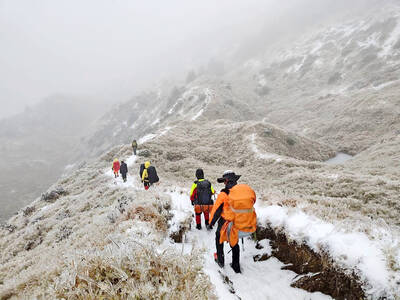Residents of Hsinchu County and several environmentalists yesterday demanded that AU Optronics Corp (AUO) and Chunghwa Picture Tubes restore an area where the Siaoli River (霄裡溪) flows through the county’s Sinpu Township (新埔) and where wastewater from the two LCD manufacturers’ plants drained into the river.
A pipe-sealing ceremony is to be held today to mark the closing of the sewage discharge pipes and bring them into compliance with the zero-liquid-discharge requirement set by the Environmental Protection Administration (EPA) in 2013.
The plants are in Taoyuan’s Longtan District (龍潭), upstream of the Siaoli River, and have discharged wastewater into the river for 16 years.
In 2013, the EPA told the companies that their plants had to recycle all their wastewater by the end of this year after repeated protests by Sinpu residents over the pollution caused by the two companies’ factories.
It was the first time the government had imposed such a requirement on technology firms.
However, environmentalists said the zero-liquid-discharge plan should be just the first step for the two firms in terms of carrying out their corporate social responsibility.
They want the companies to restore the river to a pristine condition and track the health of local residents.
“The zero liquid discharge means the end of a source of pollution, but not the end of pollution. The companies should do restoration works so that the Siaoli River can be filled with fish again,” said Chen Hsin-yuan (陳新源), director of a Sinpu residents’ self-help organization.
The companies should ensure that indium and molybdenum, two metals commonly used in LCD manufacturing, are no longer found in the river, Chen said, adding that township residents are afraid to use groundwater in the area because of pollution concerns and they have called on the central government to provide tap water to the area.
“Legal compliance is not CSR [corporate social responsibility]. CSR should not be a corporate greenwash. If AUO really wants to be environmentally responsible, it should conduct health risk assessments and long-term health tracking at all its plants,” Environmental Jurist Association secretary-general Lin Jen-hui (林仁惠) said.
Pollution-related diseases can develop years after initial exposure, so the two companies should begin a long-term health monitoring and river restoration program, Hsinchu County Councilor Kao Wei-kai (高偉凱) said.
Zero liquid discharge could lead to the generation of other forms of pollutants, such as high concentration sludge, and the companies should make public their treatment of sludge and the chemicals used in their manufacturing processes, Kao said.

Trips for more than 100,000 international and domestic air travelers could be disrupted as China launches a military exercise around Taiwan today, Taiwan’s Civil Aviation Administration (CAA) said yesterday. The exercise could affect nearly 900 flights scheduled to enter the Taipei Flight Information Region (FIR) during the exercise window, it added. A notice issued by the Chinese Civil Aviation Administration showed there would be seven temporary zones around the Taiwan Strait which would be used for live-fire exercises, lasting from 8am to 6pm today. All aircraft are prohibited from entering during exercise, it says. Taipei FIR has 14 international air routes and

The Ministry of National Defense (MND) today released images of the military tracking China’s People's Liberation Army (PLA) movements during the latest round of Chinese drills around Taiwan. The PLA began "Justice Mission 2025" drills today, carrying out live-fire drills, simulated strikes on land and maritime targets, and exercises to blockade the nation's main ports. The exercises are to continue tomorrow, with the PLA announcing sea and air space restrictions for five zones around Taiwan for 10 hours starting from 8:30am. The ministry today released images showing a Chinese J-16 fighter jet tracked by a F-16V Block 20 jet and the

Snow fell on Yushan (Jade Mountain, 玉山) yesterday morning as a continental cold air mass sent temperatures below freezing on Taiwan’s tallest peak, the Central Weather Administration (CWA) said. Snowflakes were seen on Yushan’s north peak from 6:28am to 6:38am, but they did not fully cover the ground and no accumulation was recorded, the CWA said. As of 7:42am, the lowest temperature recorded across Taiwan was minus-5.5°C at Yushan’s Fengkou observatory and minus-4.7°C at the Yushan observatory, CWA data showed. On Hehuanshan (合歡山) in Nantou County, a low of 1.3°C was recorded at 6:39pm, when ice pellets fell at Songsyue Lodge (松雪樓), a

NO SHAME IN RETREAT: Hikers should consider turning back if the weather turns bad or if they do not have sufficient equipment, the Taroko park headquarters said Two people died of hypothermia over the weekend while hiking on Hsuehshan (雪山), prompting park authorities to remind hikers to bring proper equipment and consider their physical condition before setting out in the cold weather. Temperatures dropped over the weekend, bringing snow to high altitudes in Shei-pa National Park. One hiker, surnamed Lin (林), who on Friday was traveling with a group of six along the Hsuehshan west ridge trail, lost consciousness due to hypothermia and died, the Shei-pa National Park Headquarters said. On Saturday, another hiker, surnamed Tien (田), in a group of five on the southeast of the west